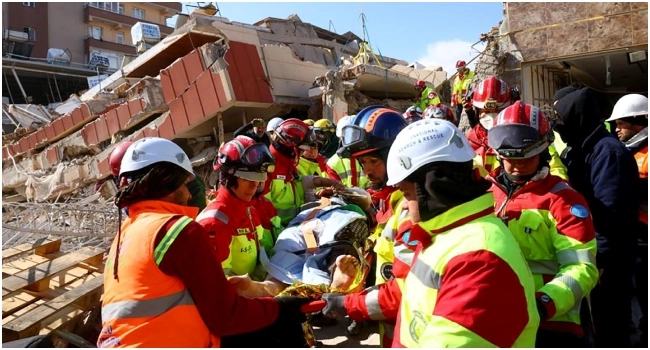As the death toll from the Turkey-Syria earthquake passes 35,000 and hopes of finding people alive under the debris fade more than a week after the quake struck, search efforts are shifting their attention to feeding and housing the enormous number of survivors.
The Turkish government reports that 400,000 victims have been evacuated from the destroyed districts, more than 206,000 tents have been set up, and around 1.2 million people have been sheltered in student housing.
At least 574 children taken from fallen buildings were discovered without any surviving parents, according to Turkey’s Vice President Fuat Oktay. Only 76 had been given back to other relatives.
In the hard-hit Hatay region, a volunteer psychologist said many parents were desperately searching for their missing children. As the telephone network began to reestablish itself in some areas of the damaged Turkish city of Antakya, cleanup crews have been moving debris and erecting makeshift restrooms, according to an AFP correspondent.
Read also: Countries caution EU against reforming energy market in crisis mode
Following many occurrences over the weekend, police and soldiers were deployed to patrol the city to deter looting.
Food and other assistance supplies were reported to be arriving in Antakya and Kahramanmaras.
According to a report released on Monday by the Turkish Employers’ Association Turkonfed, the disaster might have an economic cost of up to $84.1 billion, with approximately $71 billion of that amount going toward housing. Syria, which has already endured a 12-year civil war, is of particular concern.
An urgent UN meeting on how to increase supplies to rebel-controlled areas was convened on Monday as resentment over the slow international response to the pariah country rises.
In isolation and under Western sanctions, Syrian President Bashar al-Assad appealed for aid to help restore infrastructure in the nation, where the UN estimates that more than five million people have been rendered homeless.
UN Secretary-General Antonio Guterres was quoted as saying that Assad had agreed to allow aid into northwest Syria by opening two more border crossings with Turkey.
Before the earthquake, there was only one border through which more than four million people living in rebel-controlled areas of northwest Syria were receiving the critical humanitarian aid they needed.
Story was adapted from Channels Television.
